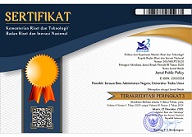Crisis as Catalyst: The Moral Origins of Collaborative Governance in Tourism Village
Abstract
Keywords
Full Text:
PDFReferences
Agrawal, A., & Redford, K. (2006). Poverty, Development, And Biodiversity Conservation: Shooting in the Dark? Wildlife Conservation Society Working Paper, 26.
Ansell, C. and Gash, A. (2008). Collaborative Governance in Theory and Practice. Journal of Public Administration Research and Theory. Journal of Public Administration Research and Theory, 18(4), 543–571.
Ansell, C., & Gash, A. (2018). Collaborative platforms as a governance strategy. Journal of Public Administration Research and Theory, 28(1), 16–32. https://doi.org/10.1093/jopart/mux030
Beeton, S. (2019). Community Development through Tourism. In Community Development through Tourism. https://doi.org/10.1071/9780643093881
Boin, A., ’t Hart, P., Stern, E., & Sundelius, B. (2016). The politics of crisis management: Public leadership under pressure. In The Politics of Crisis Management: Public Leadership Under Pressure. https://doi.org/10.1017/9781316339756
Bramwell, B., & Lane, B. (2011). Critical research on the governance of tourism and sustainability. Journal of Sustainable Tourism, 19(4–5), 411–421. https://doi.org/10.1080/09669582.2011.580586
Emerson, K., Nabatchi, T., & Balogh, S. (2012). An integrative framework for collaborative governance. Journal of Public Administration Research and Theory, 22(1), 1–29. https://doi.org/10.1093/jopart/mur011
Hawlina, H., Pedersen, O. C., & Zittoun, T. (2020). (2020). Imagination and social movements. Current Opinion in Psychology, 35, 31-35.
Hennink, M., Hutter, I., & Bailey, A. (2020). Qualitative research methods. Sage.
Hernandez, E. M. (2024). Moral Shock and Trans “Worlds” of Sense. Journal of the American Philosophical Association. https://doi.org/10.1017/apa.2023.27
Hernandez, E. M. (2024b). Moral Shock and Trans “Worlds” of Sense. Journal of the American Philosophical Association, 10(4), 761–779. https://doi.org/10.1017/apa.2023.27
Mussadad, A. A., Rahayu, O. Y., Pratama, E., Supraptiningsih, & Wahyuni, E. (2019). Pembangunan Pariwisata Berkelanjutan Di Indonesia. Dinamika Administrasi: Jurnal Ilmu Administrasi Dan Manajemen, 2(1), 73–93.
Nunkoo, R. (2016a). Toward a More Comprehensive Use of Social Exchange Theory to Study Residents’ Attitudes to Tourism. Procedia Economics and Finance, 39, 588–596. https://doi.org/10.1016/s2212-5671(16)30303-3
Ostrom, E. (1998). A Behavioral Approach to the Rational Choice Theory of Collective Action. The American Political Science Review, 92(1).
Scheyvens, R. (2002). Tourism for Development: Empowering Communities. In Themes in Tourism Series (Vol. 27).
Soundararajan, V., Wilhelm, M. M., & Crane, A. (2021). Humanizing Research on Working Conditions in Supply Chains: Building a Path to Decent Work. Journal of Supply Chain Management, 57(2), 3–13. https://doi.org/10.1111/jscm.12260
Sugiardi, S. (2024). Economic diversification strategies to improve the welfare of rural communities: literature analysis and practical implications. International journal of financial economics, 1(5), 1014-1022.
Sutomo, Y. A. W., Sianipar, C. P. M., Hoshino, S., & Onitsuka, K. (2024). Self-Reliance in Community-Based Rural Tourism: Observing Tourism Villages (Desa Wisata) in Sleman Regency, Indonesia. Tourism and Hospitality, 5(2), 448–471. https://doi.org/10.3390/tourhosp5020028
Tasci, A. D. A., Croes, R., & Villanueva, J. B. (2014). Rise and fall of community-based tourism - facilitators, inhibitors and outcomes. Worldwide Hospitality and Tourism Themes, 6(3). https://doi.org/10.1108/WHATT-03-2014-0012
Yin, R. K., & SAGE. (2003). Case Study Research: Design and Methods.
DOI: https://doi.org/10.35308/jpp.v11i3.12300
Refbacks
- There are currently no refbacks.
Copyright (c) 2025 Andang Nugerahatara Sutrisno, Janianton Damanik, Ambar Widaningrum
p-ISSN: 2477-5738 I e-ISSN: 2502-0528 I DOI: 10.35308
Jl. Alue Peunyareng, Ujong Tanoh Darat, Meureubo, Kabupaten Aceh Barat, Aceh 23681, Indonesia
(0655) 7110535 l +621260313742 l +6285277110911
 is licensed under a Creative Commons Attribution-ShareAlike 4.0 International License
is licensed under a Creative Commons Attribution-ShareAlike 4.0 International License


